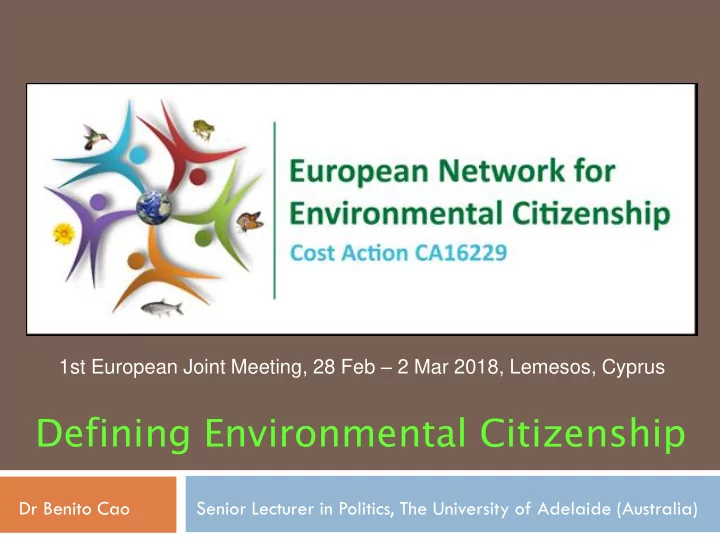

1st European Joint Meeting, 28 Feb – 2 Mar 2018, Lemesos, Cyprus Defining Environmental Citizenship Dr Benito Cao Senior Lecturer in Politics, The University of Adelaide (Australia)
environmental citizenship
environment and citizenship The Basics: Concepts and Histories Introducing Citizenship Theories Theorizing Environmental Citizenship Environmental Citizenship in Action Governing Environmental Citizenship Environmental Citizenship Incorporated Learning Environmental Citizenship
environment: the concept The roots of the term lie in the French word environ , meaning to surround, to envelop, to enclose. In this sense, environment is synonymous with surroundings. [environment: a relational concept] but typically: environment = nature = natural env.
humans and nature: two views Anthropocentrism describes the tendency for human beings to regard themselves as the central and most significant entities in the universe, or the assessment of reality through a human-centred perspective. This is a major concept in the field of environmentalism, where it is often considered to be the root cause of problems created by human interaction with the environment. Ecocentrism is used in ecological political philosophy to denote a nature-centred, as opposed to human- centred (i.e. anthropocentric), system of values.
humans and nature: history the first humans: out of nature ancient philosophers: e.g. Aristotle ancient religions: e.g. Christianity romantic authors: e.g. Keats, Byron scientific revolution ... industrialism late 19 th and early 20 th century: Conservationism e.g. National Parks tension: environment vs development mid-20 th century: environmentalism
ecological interdependence Blue Marble (1972)
sustainable development The Brundtland Report (1987) sustainable development: development that meets the needs of the present without compromising the ability of future generations to meet their own needs. the concept implies that generations yet unborn have an entitlement to live in a undiminished natural environment. i.e. the rights of future citizens/humans i.e. the responsibility of present citizens inequality: global North vs global South
sustainable consumption ecological footprint: calculator
unsustainable consumption
differentiated responsibility
environmental citizenship Van Steenbergern: Towards a Global Ecological Citizen” Van Steenbergen (1994): ecological citizenship is concerned with the rights and responsibilities of the earth citizen. Ecological citizenship consists of a series of rights (e.g. clean air, clean water … ‘right to life’) and duties (e.g. not to pollute) which should be seen as sitting alongside T.H. Marshall’s civil, political and social rights. [additional dimension] environmental, ecological, sustainable, green, etc.
citizenship: the concept ‘Citizenship is a notoriously polyvalent concept, with many meanings and applications ’. (Joppke 2010: 1) citizenship: membership of a political community which comes with a series of rights and duties . citizenship has become synonymous with membership of a nation-state, but political communities have differed throughout history: city-state, empire, nation-state , cosmopolis …
citizenship: the elements who: status [membership] what: rights [protection] civil (protection against the state: freedoms) political (right to vote and hold public office) social (protection against economic hardship) what: duties [participation] military service, social service, paying taxes obeying the laws, voting (where compulsory) serving on juries (in some countries) how: education education for citizenship is not an optional extra, but an integral part of the concept (Heater 2004)
education for citizenship Why Citizenship Matters (6:17) Short film following Hamza, a student, exploring why citizenship matters in his daily life. [note: the environment matters] the topic: moral, social and cultural issues keywords: citizenship, responsibility, future, environmental concern, recycling, caring, consequences, volunteering, stereotype. themes: recycling, bike-lanes, global poverty
membership: global village community: the planet membership: all humans Earth Hour/Earth Day future citizens/humans animals (all or only some) nature (the ecosystem)
rights: human rights to a healthy environment … health rights e.g. clean air, clean water … vs pollution example: the South African Constitution to a place where to live [climate refugees]
rights: animal rights The Great Ape Project (1993) Declaration of the Rights of Great Apes. Right to life Protection of individual liberty Prohibition of torture Paul Watson: Sea Shepherd animals feel/suffer pain … against animal cruelty the crew and passengers: survival depends on crew
rights: nature’s rights Chipko, Ecuador, Bolivia ... The Rights of Mother Earth leave things on the ground ABC: What if trees could sue?
duties: human duties duties towards nature duties towards others e.g. mindful consumption [sustainable consumption] the danger of tyranny: eco-authoritarianism green police (video link) sustainability with justice [sustainable development]
whose duties (debate) citizens/humans ... present; some more than others e.g. differentiated responsibility corporations (as citizens); CSR/CorpEnvlCiti … but: property rights voluntary duties duties outsourced states/govs: governmentality: i.e. governing through citizens; individualized responsibility.
green(ing) citizenship: r+d+m 1. impact on rights: additional rights: clear air, potable water, etc. extension of rights beyond present citizens future generations: the right to a healthy planet extension of rights beyond citizens/humans animals, nature: not to suffer, biodiversity emphasis on property rights, driven by corps. 2. impact on duties: additional duties: green duties e.g. recycling voluntary and individualised responsibilities 3. impact on membership: additional members: future humans, animals
defining environmental citizenship Environmental Citizenship is defined as the responsible pro- environmental behaviour of citizens who act and participate in society as agents of change in the private and public sphere , on a local, national and global scale , through individual and collective actions , in the direction of solving contemporary environmental problems , preventing the creation of new environmental problems, achieving sustainability as well as developing a healthy relationship with nature . Environmental Citizenship includes the exercise of environmental rights and duties , as well as the identification of the underlying structural causes of environmental degradation and environmental problems, the development of the willingness and the competences for critical and active engagement and civic participation to address those structural causes, acting individually and collectively within democratic means, and taking into account inter- and intra-generational justice . (European Network for Environmental Citizenship, 2018)
Thank you!
Recommend
More recommend